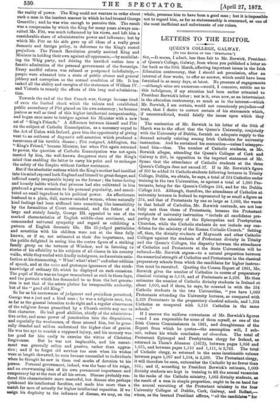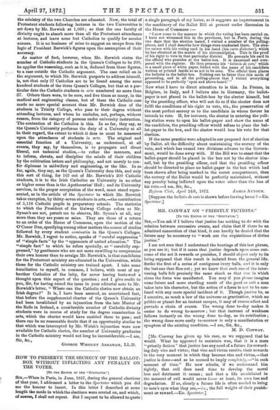LETTERS TO THE EDITOR.
QUEEN'S COLLEGE, GALWAY.
[TO THE EDITOR Or TES " SPHOTATOR.1
SIR, —It seems, I admit, less than fair to Mr. Berwick, Presiden of Queen's College, Galway, from whom you published a letter so.. far back as the 30th March, affecting important issues in the Irish Education controversy, that I should ask permission, after an interval of four weeks, to offer an answer, which could have been. furnished in as many days, at latest. No pressure of engagements. —although mine are numerous—would, I conceive, entitle me to. this indulgence, if my attention had been earlier attracted to President Berwick's letter ; nor is it, even now, as an intervenient. in the education controversy, so much as in the interest—which Mr. Berwick, I am certain, would not consciously prejudice—of truth, that I desire to correct certain of his statements which, if uncontraclicted, would falsify the issues upon which they bear.
If I assume the uniform correctness of Mr. Berwick's figures- -and I am responsible for some of them myself, as one of the- Irish Census Commissioners in 1861, and draughtsman of the- Report from which he quotes—the assumption will, I sub- mit, reduce his whole conclusion ad absurdum. The total or Protestant Episcopal and Presbyterian clergy for Ireland, as returned in Thom's Almanac (1872), between pages 1,056 and 1,075, and between pages 1,110 and 1,111, is 2,763. The total, of Catholic clergy, as returned in the same inestimable volume- between pages 1,097 and 1,104, is 2,599. The Protestant clergy, it will therefore be seen, outnumber the Catholic by no fewer than 164; and if, according to President Berwick's estimate, 1,000, divinity students are kept in training to fill the annual vacancies in the ranks of the Catholic ministry, 1,063 divinity students, as the result of a sum in simple proportion, ought to be on hand for the annual recruiting of the Protestant ministry in the four University Colleges of Dublin, Cork, Galway, and l3elfasb,— where, as the learned President affirms, "all the candidates "for;
the ministry of the two Churches are educated. Now, the total of Protestant students following lectures in the two Universities is set dowp by Mr. Berwick at 1,060; so that the one faculty of • divinity ought to absorb more than all the Protestant attendance at lectures, and leave none but Catholics to qualify for secular careers. It is no business of mine to suggest an escape from the logic of President Berwick's figures upon the assumption of their accuracy.
As matter of fact, however, when Mr. Berwick states the number of Catholic students in the Queen's Colleges to be 200, he applies the reasoning, such as it is, deduced from these figures, to a case outside the Catholic argument. The case relied on in the argument, to which Mr. Berwick purports to address himself, is, not that only 37 Catholics are to be found among the some hundred students of the three Queen's Colleges, but that at a par- ticular date the Catholic students in arts numbered no more than 37. Others there were, to be sure, and five times as many, in the medical and engineering classes, but of these the Catholic case made no more special account than Mr. Berwick does of the students in Trinity College, who pass to their degree without attending lectures, and whom he excludes, not, perhaps, without reason, from the category of persons under university instruction. The contention of the Catholics is this. In so far, they say, as -the Queen's University performs the duty of a University at all in their regard, the extent to which it does so must be measured upon the attendance of students in arts. The original and -essential function of a University, as understood, at all events, they say, by themselves, is to propagate and direct liberal, not technical studies,—to refine the manners, and to inform, elevate, and discipline the minds of their children by the cultivation letters and philosophy, and not merely to con- fer diplomas in midwifery and engineering, or the like. In so far, again, they say, as the Queen's University does this, and only this sort of thing, for 163 out of Mr. Berwick's 200 Catholic students, it is to the Irish Catholics an University in no other
or higher sense than is the Apothecaries' ; and its University -services, in the proper acceptation of the word, must stand repre- sented, as in the article of the Spectator to which Mr. Berwick takes exception, by thirty-seven students in arts,—the contribution -of 5,118 Catholic pupils in preparatory schools. The statistics to which the President of the Galway College refers as Mr. Synan's are not, permit me to observe, Mr. Syrian's at all, any more than they are yours or mine. They are those of a return to an order of the House of Commons, upon the motion of the O'Conor Don, specifying among other matters the course of studies followed by every student nominatim in the Queen's Colleges. Mr. Berwick, I regret to notice, speaks of "careful suppression" of "simple facts" by the "opponents of united education." The "simple fact" to which he refers specially, as " carefully sup- pressed," by gentlemen who are not more unwilling to compromise their own honour than to arraign Mr. Berwick's, is that candidates for the Protestant ministry are educated in the Universities, while those for the Catholic ministry are trained apart. I take some humiliation to myself, in common, I believe, with most of my brother Catholics of the laity, for never having bestowed a thought upon this aspect of the question ; and I give credit to you, Sir, for having raised the issue in your editorial note to Mr. Berwick's letter, "Where can the Catholic clerics now obtain an Irish degree?" It is, I have been assured, an ascertained fact, that before the supplemental charter of the Queen's University had been invalidated by an injunction from the late Master of the Rolls in Ireland, a considerable number of Catholic divinity students were in course of study for the degree examination in arts, which the charter would have enabled them to pass ; and there can be no reasonable doubt that if an opportunity similar to that which was intercepted by Mr. Walsh's injunction were now available for Catholic clerics, the number of University graduates in the Catholic ministry would not long be inconsiderable.-1 am, Sir, &c.,
GEORGE WHITLEY ABRAHAM, LL.D.



































 Previous page
Previous page